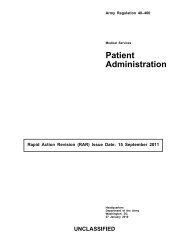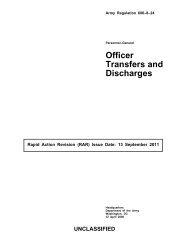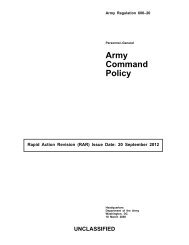Care and Disposition of Remains - Army Publishing Directorate ...
Care and Disposition of Remains - Army Publishing Directorate ...
Care and Disposition of Remains - Army Publishing Directorate ...
Create successful ePaper yourself
Turn your PDF publications into a flip-book with our unique Google optimized e-Paper software.
e. The unremarried former spouse <strong>of</strong> a soldier or former soldier who on the date <strong>of</strong> the final decree <strong>of</strong> divorce,<br />
dissolution, or annulment, has been married to the soldier or former soldier for a period <strong>of</strong> at least 20 years during<br />
which period the soldier or former soldier performed at least 20 years <strong>of</strong> service that is creditable in determining that<br />
soldier’s or former soldier’s eligibility for retired or retainer pay, or equivalent pay, <strong>and</strong> does not have medical<br />
coverage under an employer-sponsored health plan.<br />
f. A person who is the unremarried former spouse <strong>of</strong> a soldier or former soldier who performed at least 20 years <strong>of</strong><br />
service that is creditable in determining the soldier’s or former soldier’s eligibility for retired or retainer pay, or<br />
equivalent pay, <strong>and</strong> on the date <strong>of</strong> the final decree <strong>of</strong> divorce, dissolution, or annulment before 1 April 1985, had been<br />
married to the soldier or former soldier for a period <strong>of</strong> at least 20 years, at least 15 <strong>of</strong> which, but less than 20 <strong>of</strong> which,<br />
were during the period the soldier or former soldier performed service creditable in determining the soldier or former<br />
soldier’s eligibility for retired or retainer pay, <strong>and</strong> does not have medical coverage under an employer-sponsored health<br />
plan.<br />
g. A person who would qualify as a dependent under (f) but for the fact that the date <strong>of</strong> the final decree <strong>of</strong> divorce,<br />
dissolution, or annulment <strong>of</strong> the person is on or after 1 April 1985, except that the term does not include the person<br />
after the end <strong>of</strong> the 1-year period beginning on the date <strong>of</strong> that final decree.<br />
h. An unmarried person who is placed in the legal custody <strong>of</strong> the soldier or former soldier as a result <strong>of</strong> an order <strong>of</strong><br />
a court or competent jurisdiction in the United States (or a Territory or possession <strong>of</strong> the United States) for a period <strong>of</strong><br />
at least 12 consecutive months <strong>and</strong> either—<br />
(1) Has not attained the age <strong>of</strong> 21; or<br />
(2) Has not attained the age <strong>of</strong> 23 <strong>and</strong> is enrolled in a full time course <strong>of</strong> study at an institution <strong>of</strong> higher learning<br />
approved by the administering Secretary; or<br />
(3) Is incapable <strong>of</strong> self-support because <strong>of</strong> a mental or physical incapacity that occurred while the person was<br />
considered a dependent <strong>of</strong> the soldier or former soldier under this subparagraph pursuant to (1) <strong>and</strong> (2);<br />
(4) Is dependent on the soldier or former soldier for over one-half <strong>of</strong> the person’s support;<br />
(5) Resides with the soldier or former soldier unless separated by the necessity <strong>of</strong> military service or to receive<br />
institutional care as a result <strong>of</strong> disability or incapacitation or under such other circumstances as the administering<br />
Secretary may by regulation prescribe; <strong>and</strong><br />
(6) Is not a dependent or a soldier or a former soldier under any other subparagraph.<br />
2–14. Dependents <strong>of</strong> Department <strong>of</strong> the <strong>Army</strong> <strong>and</strong> Department <strong>of</strong> Defense civilians employees<br />
The criteria for designation as a dependent <strong>of</strong> a civilian employee are established by 5 USC 5742. To be authorized<br />
mortuary affairs benefits the employee’s dependent must be residing with the employee while assigned to an <strong>of</strong>ficial<br />
duty station outside <strong>of</strong> the continental United States or in transit to or from the employee’s <strong>of</strong>ficial duty station.<br />
Mortuary affairs benefits for dependents <strong>of</strong> civilian employees are located in table 2–1. The statute defines dependents<br />
as—<br />
a. Spouse.<br />
b. An unmarried child (including an unmarried dependent stepchild or adopted child) under 21 years <strong>of</strong> age.<br />
c. A dependent mother or father.<br />
d. A dependent designated in <strong>of</strong>ficial records.<br />
e. An individual determined to be dependent by the head <strong>of</strong> the agency concerned or designee.<br />
2–15. Dependents <strong>of</strong> retired military personnel<br />
To be eligible for mortuary affairs benefits, the sponsor must meet the criteria prescribed in paragraph 2–8. Mortuary<br />
affairs benefits for dependents <strong>of</strong> retired military personnel are located in table 2–1. The criteria for dependents <strong>of</strong><br />
retired military personnel for mortuary affairs benefits are derived from Federal statutes (10 USC 1072 (2) <strong>and</strong> 1481,<br />
see para 2–13). To be authorized mortuary affairs benefits the dependent must be—<br />
a. A properly admitted inpatient, as defined in the glossary, <strong>of</strong> a U.S. Government medical treatment facility, as<br />
defined in the glossary.<br />
b. Die while on an <strong>Army</strong> installation or other <strong>Army</strong> facility; <strong>and</strong> whose remains are unclaimed by the decedent’s<br />
family <strong>and</strong> friends, <strong>and</strong> refused for disposition by local civil authorities.<br />
c. Die outside <strong>of</strong> the United States<br />
2–16. Other U.S. citizens <strong>and</strong> their dependents who die outside <strong>of</strong> the United States<br />
Other U.S. citizens <strong>and</strong> their dependents who die outside <strong>of</strong> the United States are authorized mortuary affairs services<br />
on a reimbursable basis. <strong>Army</strong> mortuaries outside the United States may assist in arranging commercial transportation<br />
for the remains. <strong>Remains</strong> <strong>of</strong> employees <strong>of</strong> other U.S. Government agencies <strong>and</strong> non-U.S. Government persons may not<br />
be shipped aboard DOD aircraft on a reimbursable basis unless such a request is made by the Department <strong>of</strong> State <strong>and</strong><br />
the request is approved by the Secretary <strong>of</strong> Defense (DOD 4515.13–R). Available mortuary affairs services are located<br />
in table 2–1. To be authorized a mortuary affairs services on a reimbursable basis the decedent must be—<br />
AR 638–2 22 December 2000<br />
21
















